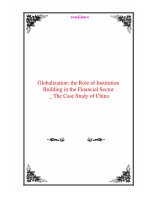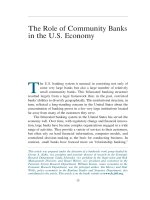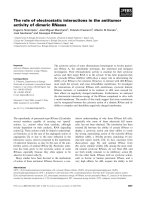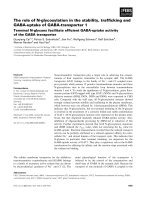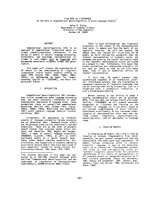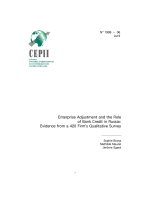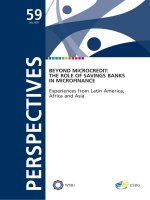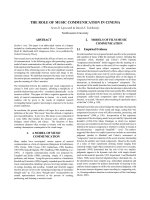Enhancing the role of inspection agencies in prevention and anti corruption from reality in hai duong province
Bạn đang xem bản rút gọn của tài liệu. Xem và tải ngay bản đầy đủ của tài liệu tại đây (7.4 MB, 83 trang )
UPPSALA
UN1VERSITET
UPPSALA UNIVERSITÉT &
VNU UNIVERSITY OF ECONOMICS & BUSINESS
***
VNUUEfB
—
MASTER THESIS OF MPPM
E N H A N C I N G T H E RO L E OF I NS PEC TI ON A G E N C I E S
IN P R E V E N T I O N A N D A N T I - C O R R U P T I O N
F R O M RE AL ITY IN HAI DƯ ONG P R O V I N C E
Author:
Nguyen Quoc Khanh
Supervisor:
Prof. I)r. L a r s - T o s t e n
Local Supervisor: Dr. Nguyen Khac Hung
Class:
MPPM - Intake 7
Hanoi, .lanuary - 2015
Eriksson
A C KNOW L EDGM EN TS
I made this thesis in the Master's prograin management from the University
of Economics - Hanoi National University and the University o f Uppsala in
Svveden. 11 conlìrms that the thesis cannot perform well without the guidance and
support of dedicated instructors: Prof. Dr. Lars - Tosten Eriksson, University of
Uppsala - Sweden and Dr. Nguyen Khao Mung, director of Institute of leadership
and management (LM1), Chairman of the Board of Consulting and Development
management JSC (MCAD). I sincerely thank to Prof. Dr. Lars - Tosten Eriksson
and Dr. Nguyen Khac Hung who has supported me during this thesis research.
Sincerely thank Protèssor, Associate Professor, PhD of the University of
Uppsala - Sweden and the Professor, Associate Protcssor, PhD o f íhe Institute of
Hinance and Administratiơn Institute, Academy of Social Sciences, Economic
University, íianoi National University who enthusiastically communicate the
importance o f scientiíìc knovvledge and research experience in the master's program
manager for my company
Thanks comrades and leaders of Inspector Hai Duong, chief inspector o f Gia
Loc District, Tu Ky District, Kim Thanh District, Thanh Ha District, Ninh Giang
District. Chi Linh Tovvn, Hai Duong City, thanks People’s Committee of
Coinmunc, l u Ky District, Tran Phu Ward People's Committee o f Mai Duong;
l.cadcrs and olíìcials of the Departmcnts o f Finance, Construction, Transportation,
Natural Resources and Environment o f Hai Duong Province and Mr. Chairman
Ninh Giang District, Nam Sach District, Chainnan o f Hai Duong City cooperation
to makc it I íầcilitate research, completed data collection to build of this thesis.
Sincerely yours!
SUM MARY OF MASTKR THESIS
1-Thesis title: ENHANCING THE ROLE OF INSPECTION AGENCIES IN
PREVENTION
AND
ANTI-CORRƯPTION
FROM
REALITY
IN
HAI
DUONG PROVINCE
2-LeveI: Graduation thesis of Public Management Master Program
3-
Author: Nguyen Quoc Khanh
4- Instructors:
Vietnaniese: Dr. Nguyen Khac Hung
Director o f Institute o f Leadership and Management (LMI); Board Chairman
of Management Consultancy and Development JSC. (MCaD)
Sweden: Prof. I)r. L a r s - T o s t e n Eriksson
Uppsala University - Svveden
5- Thesis presentation date: 05-12-2014
6- Objectives: Corruption situation in Vietnam is novv very serious, have become
the national evils, corruption is presented very where and any sector, with the tricks
is more and more sophisticated, levels is largcr and larger in scale.
- Inspection Agency is a permanent body against corruption but the anti-corruption
inspection agency is not so effective: Study objectives:
The rcsearch is to discover some hidden problems and reasons that limited role of
tho State inspcction organ i/ation s in d etecting and handling corruption, proposing
solutions to enhance the role of thc State Inspection organi/ations and anticorruption measures.
7- Methodology:
7.1 Overview Research Methodology: Includes the laws, thc legal documents ofthc State.
7.2 Data collection methodology:
a. Secondary intbrmation and data collection method: Research documents
and reports, conclusions o f Hai Duong Province inspection.
b. Priinary infonnation and data collection methodology:
-
Survey by questionnaire vvith 55 persons who work for provincial and
district and departmcnts inspection agencies in Hai Duong province, to collect
in lb r m a t io n a b o u t t h e ir v ic v v s a n d t h e ir a s s e s s m e n t :
c u r r c n t S tate o f c o r r u p t io n ,
reality and role o f the current inspection agencics in the prevention and anticorruption, what to do to strengthen the role o f inspection agencies in the prevention
and anti-corruption? Which íactors affecting the quality o f inspection vvork in
prevention and anti-corruption?
- Interviews some related obịects, consist of 3 Chairman o f District People
Committee; 10-13 inspectors; 1-2 enterprises (Inspection Objects), one lawyer
7.3 Data analysis methodology:
Based on the results o f thc inspection data on a number of econoinic - social
sectors, analysis to assess the eíYectiveness o f anti-corruption inspection activities,
\vhich tound the role o f inspection agencies in prevention and anti-corruption vvork;
Analyze the role o f inspection in the State management, thc dircction and
check o f the superior for knver levels;
- Expert Methods: During iinplementing the thesis, I ahvays get the support of
experts inside and outside o f inspection industrv and o f the instructors at the
University o f Uppsala - Svveden and Vietnam.
8. Results & conclusions:
8.1 Research results:
a) The role o f inspection in accordance with the Inspection Law in 2010.
+ In term o f the organi/.ation: Inspection Agency is an agency under the
administrative agency o fth c same level.
+ In term o f povver:
- Pcríbrm inspection function as planned. Must be approved hy head of
administrative agency at the same level.
- Only have the riaht to recommend.
- Do not have thc pcnvcr to investigate, propose to prosecute and apply
ineasures to prevent (Put in temporary detention, take into custody).
b) Realitv o f anti-corruption inspection in Hai Duong Province, in the fields:
- Inspection in the íìeld o f budget managemcnl.
- Inspection in the íìcld o f taxation.
- Inspection in the íìcld oí'basic construction investment.
10- Contribution of the thesis:
With the ĩramevvork o f this thesis cannot be deeply and comprehensively
analy/cd to give thc solutions fully and eíYectively. With the ability and expericnce
in thc inspection industry, vve íìnd that the above iìndings are completely correct,
contribute to the inspection industry, and competent governmcnt agcncies to see the
cause and role of inspection is limited in the prevention and anti-corruption in the
past year it bluntly, therelbre can not prevent corruption..
Whcn having conditions to continue further research, I hope to focus 1'urthcr
on the causes and consequences, motivations oí' corruption acts, the internal and
extemal factors in the impact of this phenomenon, the with experience in the
country as vvell as intcrnationally to be able to make the more feasible solutions to
build inspection sectors vvith hiah position and role in the prevention and anticorruption in the province from now to the year o f 2030.
INDEX
ACKNOW LEDGMENTS
SU M M A R Y OF M A STER THESIS
A B B R E V IA T IO N S
IN T R O D U C T IO N ............................................................................................................ !
1. The reason for selecting the topic........................................................................1
2. The Research O b je c tiv e s....................................................................................... 3
3. Research Q uestions..................................................................................................3
4. Research M ethod olo gy :......................................................................................... 3
5. The lim itations:.........................................................................................................4
6. Thesis Layout: This thesis consists o f an introduction and three chapters:.....5
C H A P T E R I: T H E O R IES OF INSPECTIO N A N D A N TI-C O R R U PT IO N ;
RHG ULATION ON INSPECTION A N D A N T I-C O R R U P T IO N ..................... 6
1.1 THEOR1ES OF INSPECTIO N A N D A N T I-C O R R U P T IO N ..................6
1.1.1 The concept o f c o rru p tio n :......................................................................... 6
1.1.2. The basic characteristics o f corruption....................................................9
1.1.3 Corruption identiíìcation...........................................................................1 1
1.2 R E G U LA TIO N S ON INSPECTIO N, PR E V E N T IO N AN D ANT1C O R R U P T IO N ...........................................................................................................12
1.2.1 Prevention and anti-corruption Law in 2005 regulated corruption is
an act o f the people with power, corruption behavior is constituted by
three íầctors: the behavior o f power person; Took advantage o f their
positions and povvers; for the purposes o f self-interest............................... 12
1.2.2 Regulations o f the ỉnspection L a w ........................................................ 17
1.3 FU N CTIO N S A N D DUTIES A N D PO W ERS OF IN SPECTIO N
SE C T O R IN PREV EN TIO N A N D A N T I-C O R R U PT IO N (within the
framework o f this thesis reíers only to administrative level inspection from
governm ent inspector to district level inspector)...............................................21
1.3.1 The Governm ent Inspectorate:................................................................21
1.3.2 Provincial Inspectorate.............................................................................. 24
1.3.3 District Inspectorate.................................................................................... 26
CHAPTER
II:
REAL
SITUA TION
OF
INSPECTION ACTIVITIES
IN
PREV EN TIO N A N D A N TI-C O R R U PT IO N IN HAI DUONG PROVINCE ...28
2.1 S um m ary characteristics and social-econom ic situation in Hai Duong
p ro v in c e :........................................................................................................................ 28
2.2 The resuỉts o f anti-corruption inspection activities in a num ber o f social
and econom ic sectors o f Hai D uong province Inspectorate:..........................29
2.2.1 A nti-corruption inspection in the íìeld o f budget m anagem ent at the
level o f com m unes, districts, cities and tow n s...............................................29
2.2.2 A nti-corruption Inspectorate in the tìeld o f Land M anagem ent; ...35
2.2.3 A nti-corruption Inspection in the ĩield o f tax m anagem ent for
e nterprises..................................................................................................................41
2.2.4 A nti-corruption
inspection
in the íìeld o f basic construction
investm ent m a n a g e m e n t....................................................................................... 45
2.3 The cause o f violations that leads to corruption exists............................. 53
2.3.1. C auses and objective co n d itio n s.............................................................. 53
2.3.2. C auses and subjective c o n d itio n s ............................................................54
2.4 Som e basic elem ents reduce impact o f anti-corruption inspection
activities.......................................................................................................................... 56
2.5 Som e o f the changes in perspective,
perceptions, assessment o f
individuals and organizations from etTectiveness o f insp ectio n :....................58
C H A P T E R III: C O N C L U S IO N S A N D R E C O M E N D A T IO N S ...................... 63
3.1 C o n c lu s io n s ........................................................................................................... 63
3.2 R ecom m endations: Som e solutions for improving the role o f inspection
activities to prevent corruption in Hai D uong province in the period o t '2015
- 2 0 3 0 ....................................................................................................................................... 63
3.3.
O rientation for tưrther research:
REFERENCES
A P P E N D IX
67
ABBREVIA TIONS
PCTN
:
Anti-Corruption
UBND
:
People's Committees
HĐND
:
The People's Council
CìCNQSD
:
Land use right certitìcates (LURC)
TGTGT
:
Value-added tax (VAT)
TTg
:
Prime Minister
CP
:
Government
NQ
:
Resolution
BC
:
Report
XDCB
:
Basic Construction
NSNN
State Budget
1
INTRODUCTION
1. The reason for selecting the topic
Corruption is the behavior of person vvith positions and povvers, took advantage
oi' his position and povver for the purpose of proíìt. Corruption is a social evil
associated with the communication process and use the povvcr of the agencies in
political system of each country. As obstacles to the implementation of policies and
laws of the State, resistance to social development, distorts economic relations, eroding
ethical values. Corruption is essentially a combination of tvvo factors: povvcr and selfinterested. The hanníul eíTects of corruption behavior is very large. directly harm to the
property of thc State, organi/ations and individuals in society, constraining economic
a n d s o c ia l d e v e lo p m e n t
of
th e c o u n tr y . a í ĩ e c t i n g r e v o lu t io n m o r a lity , p u b lic S e r v ic e
culture of oíĩicials, undermining the people’s trust vvith the State.
In recent years, our country has made signiíìcant achievements in the
constant economic and social innovation, social security is maintained, people's
living standards is morc and more improved. Hovvever, vvc are still íầcing mạịor
challenges and risks. Corruption situation has been very complicated in many areas
and tended to increase in scale, increasingly serious nature, rcílectcd in the number
of State’s assets are appropriated or loss; violators of thc law, including many
oHìccrs, puhlic oỉTicials even including somc ỉeađers, senior managers who liave
behaviors of corruption, appropriation o f State assets. Rcsolution o f the 9lh Party’
Congress has essessed: “corruption and degradation ol'ideology. politics, ethics and
liíestyle in a not-small part of olTcials and Party mcmhcrs are very serious.
Corruption lasted for a long tiine in apparatus o f the political system and thc
economic organi/ations is a major risk threatening the survival of the regime”
Prevention and anti-corruption was paid attention hy the Party and State,
thereíore, it has achieved certain results. But vve must írankly admit that the
prevention, detection and handling oí' corruption for the last time has still limited
compared to the requirements and expectations o f the people. Períecting the
institution of prevention and anti-corruption is still slow; propagation and
disscmination, legal education has not met the requirements; officials and civil
servants, people accused of corrupt behavior less, in \vhcn there is no eíTective
mechanisms to protect and revvard whistleblowers. Responsibility, leadership
abilities, íìghting force of some committees, pioneer, exemplary o f part of officials
and Party members are not high. Many prevention and anti-corruption ineasures are
in term of formalism. Organization, operation. capacity of organizations and
olììcials in charge of prevention and anti-corruption is still inadequate. The
coordination relationship among the litigation implementation agencies and
betvveen the litigation implementation agencies vvith the inspection and audit
agencies in the detection and treatment of cases, corruption cases sometimes are not
close. Corruption detection is still vveak, some corruption cases are detected and
processed through the operation of inspection and audit agencies is still less.
Corruption asset yield is very lovv. Corruption remains seriously in many sectors
and levels, many areas, especially in the íìeld o f íìnance and banking; management
and land use; management and exploitation o f natural resources, minerals and
public investment. Sundry corruption situation is sho\vn in the bribery in tìekl of
administration, public services, bribery vvhen dealing uith the public authorities,
still smarting. The detection of corruption reniains vveakncss. The handling of
corrupt behavior in some cases expresses lenient; abusc remains to be disciplined,
administrativcly sanctioned instead of prosecutions, the accused prosecuted
according to law. Promoting the social role and. responsibility and international
cooperation in the prevention and anti-corruption are limỉtcd. Corruption is still a
challenge and is one of the most pressing issues o f today's society.
Currently, the prevention and anti-corruption is the responsibility of many diíTerent
agencies including (1) Prevention and Anti-Corruption
Department dirccts.
coordinates, inspects and urgc prevention and anti-corruption activities; (2) The
National Assembly, PeopIe's Councils at all levels supervise the prevention and
anti-corruption; (3) the govemment's inspection agency, the Ministry of Public
Security, Ministry of Deíence, Institute o f the Supreme People's Procuracy, the
Suprcmc People's Court, thc State Audit organizatỉon direct and guid to pcrtorm
prevention and anti-corruption vvithin the assigned tunctions and tasks. Each agency
has diiTcrent roles, ỉunctions and tasks. The rolc o f inspection agencies are
3
established under thc administrative level (Government Inspection, Provincial and
district level Inspection) in the prevention o f corruption in recent years has taken its
íunctions, but also must look into the fact that the corruption detection is not liigh.
Thereforc, as a leader o f inspection industry of 1ỉai Duong province with over 20
years of vvorking, I \vould like to contribute my little opinion on the anti-corruption
so I ch o se the topic "Improving the role of inspection agency ỉn
w ork,
prevention and anti-corruption from reality in Hai Duong province”
as my
Mastcr graduation thesis.
2. The Research Objectives
The research is to discover some hidden problems and reasons that
lim ite d
role
o f th e
S ta te i n s p e c t i o n
o r g a n iz a tio n s
in d e t e c t i n g
a n d h a n d lin g
corruption, identiíying the strengths, vveaknesses, opportunities and challenges
o f inspection organization in the prevention and anticorruption, through that
proposing solutions to enhance the role o f the State Inspection organizations
and anti-corruption measures.
3. Research Questions
This thesis íocuses on answering the follovving questions:
- Situation, the status ofcorruption in Vietnam in general and in particular in Hai
Duong province? And hovv is the role of the State inspection agencies in detecting
and preventing corruption?
- The cíTects oí' inspection activities? Solutions to enhance the role of inspection
activities in the corruption detection and prevention?
4. Research Methodology:
4.1. Overview Research Methodology: Includes the laws, the legal documents of
the State, speech of leaders of Communist Party and the State, and inspection
magazine o f the industry.
4.2. Data collection methodology:
a. Data secondary and collection method: Research documents and reports
such as the report of the People's Council and People's Committee of Hai Duong
province; the conclusion o f social-economic inspection of Hai Duong Province.
b. Primary intbnnation and data collection methodology:
4
1)
Survcy hy questionnaire with 55 persons who work for provincial and
district inspection agencies, and inspection dcpartments in Hai Duong province, to
c o lle c t
in f o r m a t io n
about
th e ir
v ie v v s
and
th e ir
a sse ssm e n t:
current
S ta te
of
corruption. reality and role of the current inspection agencies in the prevention and
anti-corruption, what to do to strengthcn the role of inspection agencies in the
prevention and anti-corruption? Which tầctors atTecting thc quality of inspection
vvork in prevcntion and anti-corruption?
2) Interviews some related objects, consist of 3 Chairman of District Pcople
Committee; 10 -13 staff and inspectors; 1-2 enterprises (Inspection Objects), one
lavvyer vvith contents related to the perspective and role of the inspector, cause of
inspection’s role is lovv in thc prevention and anti-corruption and rneasures to
enhance the role o f inspectors in thc anti-corruption and corruption situation
tbrecast vvith the period from now until 2030.
4.3. Data analysis methodology:
-
Comparison: Based on the results of the inspection data on a numher of
economic - social sectors, analysis to assess the effectiveness o f anti-corruption
inspection activities, which found the role of inspection agencies in anti-corruption
\vork.
- Cause and clTcct analysis: Analy/C thc role of inspection in the State
managcment, the direction and check of thc superior for lovvcr levels, chcck the
loopholes in legal policies to add and edit timely accordingly.
- Expert Methods: During implementing the thesis, I alvvays get the SLipport of
cxperts inside and outside of inspection industry and of the instructors at the
University of ưppsala - Svveden and Vietnam.
5. The limitations:
The topic has researched on a very large problem, vvith strategic meaning;
r e la t e d
to
th c p o li t i c a l
institutions of the
S tate
and being
con cern ed by
the Party
and
State. In thc framework of this thesis, in tcrms o f the level, duration and limited
tìnancial resources, it is unable to meet all research requirements, vvhich should
have a longer time; legal framework and political system that the target could be
solvcd more elTectively.
5
6. Thesis Layout: This thesis consists of an introduction and thrcc chapters:
Introduction: This section includes reasons for choosing thc topic, identifying
the objectives, research methods, research questions.
Chapter I: Theories of inspection, prevention and anti-corruption; regulation
on inspection and anti-corruption
Chapter II: Real situation o f inspection activities in prevention and anticorruption in Hai Duong province.
Chapter III: Conclusions and Recommendations
6
CHAPTER I:
THEORIES OF INSPECTION AND ANTI-CORRUPTION; REGULATION
ON INSPECTION AND ANTI-CORRUPTION
1.1 THEORIES OF INSPECTION AND ANTI-CORRUPTION
/, /. / The concept o f corruption:
In the broadest terms, corruption is understood as the act of any person with
positions and povvers or assigned duties, povvers and abuse their positions and
povvers, or duties assigned to profit-making. Guidance documentation of United
Nations about International anti-corruption íìght (1969) dcíìned corruption in a
narrow range, that takine advantage o f State povver for private proílt - m aking.
Some countries worldwide have perceptions of corruption as follows:
According to Svvedish researchers Assoc. PhD. Erlingsson1, picture of
c o r r u p t io n w o u l d b e i n c o m p l e t e i f e q u a t e c o r r u p t io n a s b r ib e r y : "
Corruption must
be defined as unethical behavior and obuse o f power - any jobs that lack o f
obịective o f the people in the public sector lead to bias andpersonal bene/ìts. "
The United Natiorvs documents ahout the anti-corruption íìght has detìned that
corruption is abusing power for personal proíìt. Committee in charge of corruption
issucs of the European Council deíĩned “Corrupíion is an bribery behavior and any
other behavior o f the person who is assigned the responsibilitv has been identified
in the State sector and opened private sector, leading to failure to implement the
obligatiom o f State offìcials, employees, independent correspondents or other
relations to make illicit proỹits fo r him sel/and for other people ”...
World Bank deíìned: “Corruption is the abuse o f public poxver fo r private
bene/it. ”2
Poundation Charter of Transparency International Organization (TI), and
nonproílt independent organi/ation vvith global scale that monitors corruption status
Resource: Corruption Perception Index 2013, IT (International Transparcncv). hllp://vietnam nel.vn/vn/chinhlri/152698/it-thain-nhung—thuv-dicn-van-lu-nhan—khona-phiii-lhicn-ihan-.htnil
Resourc : htlp:// victnamesc.victnam.usem bassy
7
around the vvorld, is headquartered in Berlin, l edcral Republic of Germany delìned
corruption as "abuse of public povvcr for private bcnelìt".
According to Mr. Boris Begovic, Vice President, Centre o f Liberal-Democratic
Studies (CLDS) United States3, thc economic theory outlined tvvo basic vievvs on
corruption. The íìrst view considers corruption as an cxogenous factor; second view
shovvs that corruption is endogenous íactor in politics. If we apply one of the tvvo
above views, we can divide corruption into three basic categories: corruption to
accelerate the schedule, administrative corruption and "bending the lavv". Although
in most cases, corruption may bc due to plunder the spoils, but the selíìsh
individuals seek to maximize their own intcrests as well as the complex and vague
lavvs, and the lack o f ieasibilitv as also are thc cause of that situation.
The concept o f corruption in Vietnam:
Accordine to Vietnamese Dictionary is: "Corruption is the abuse their
authority to harass people and get vvealth."4
Grcat Vietnamese dictionary ( Cultural - Intbnnation Publishers, Hanoi. 1998. page
1523) outlined the concept: "Corruption is the abuse theirposỉtions andpowers,
social status ọ/ State employees to contravenes the law or abusing legal loopholes
to pro/ìt for them, harmýul to society, fo r the people
The Ordinance against corruption dated 26-2-1998 also clearly stated in
Article 1: "Corruption is the behavior o f those who has positions and powers were
abusing positions and powers in order to embezzle, bribe or attempt which is
contrary to law because the prọ/ìt engine, causing damage to the property o f the
State, colỉectives and individual, invasive proper /unctioning o f institutions and
organizations.
Corrupíion is the biggest obstacle in the process o f social
development; the risk is directly related to the survival o f the State
-
Curriculum of economic and social policy (Science and Technology
Publishing House, Hanoi. 2000, p 457) stated: Although expressed in dilTerent
ways, corruption is understood fairly untied in leaal culture in countries around the
\v o r ld , th a t is t h e a d v a n t a e e o f p o s it io n , a u t h o r ity to c o m m i t
Resoure coruplion cipc0305.hlml
4 Victnamese Dictionarv - Publishing llouse o f Social Scicnees, llanoi, I98X
illegal
a c t s fo r p e r s o n a l
X
gain or in other vvords, corruption is the
11SC
or usurp illcgally
th c
public povvers or
collectives resources.
Law on prevention and anti-corruption 20056 regulated: Corruption is the
behavior of persons with positions and povvers. took advantage of their positions
and povvers tbr their proíìt. Person with positions and povvers, limited to thosc vvho
work in agencies, organi/.ations and units o f the political system; In othcr words, at
the agency, oruani/.ation or unit that use budget,
C apital
and assets of the State. With
such limitation is to focus on anti-corruption lìaht in the regions that occur most
popular, suitable for the application of measures to prevent and comhat corruption,
such as: asset disclosure, openness and transparency in the activities of agencies,
organizations, and units that handle the responsibilities of the leader.
Transparency International (TI) has estimated that annual amount o f bribes
globally could reach 20 to 40 billion dollars, used fo r lubrication o f the investment,
business activities or administrative procedures
Forbes says íhat the list o f the most corrupt countries o f the world is based on
transparent assessment o f International Transparency organization, a survey by the
World
Bank
and
the
Bertelsmcnm
Trans/ormation
Index
o f Bertelsmann
organization, n hích is used to assess the ỉeveỉ o f development in 128 countries.
Political and Economic Risk Consultancy (PERC), headquartered in Hong Kong,
ranked Vietnam in thirciposition in the list o f most corrupt countries in Asia-Pacific
in a recent economic report.
The most corrupt country is Indonesia, one o f the economies thai are booming in
the continent.The second position, before Vietnam is Cambodia. After Vietnam is
Philippines
PERC has reviewed 16 Asia-Pacific nations in perspective o f foreỉgn investors.
This organỉzaíion has consulted the opinions o f 2174 luxury and midsiie
businessrnan in the regỉon
'
Resource: Syllabus o f Society - Kconomic policy, Science and I cchnologv Publishing I louse. I lanoi.
() Resource: National politics Publisher.House, tlanoi.
9
The organization noted that in Indonesia, corruption is rampant on all levels
and struggling against corruption o f President Susỉlo Bambang Yudhoyono is
hampered when the threatened/orces try to politicize this topic.
PERC's report says: “Corruption has become a crime thai those \vho use for
self-defense and against reform. The antỉ-corruption Jìght today threatened to do
corruption.
Indonesia was scored 9.07 marks out o f 10 in the survey in 2010, last year this
coimtry was 7.69 marks.
Countrỉes such as Thailand, India, Chỉna and Malaysia also considered as high
levels o f corruption
Meatnvhile, Japan, the u s, Hong Kon%, Australia and Singapore are the least
level o f corruption.
Meanwhile, at the end o f last year, the report o f Transparency International
(Transparency International) soid: after one year, a lot o f the economies were in
crisis, the report noted that “corruption is a threat to economic recoverv and is a
great challenge for countries in conỳlict"
Vietnam Government ahvavs affirms that anti-corrnption is one o f the top priorities,
hut ulsu admits thai this problem meet much diffỉculties. On 26/102010 Transparency
International (TI) has announced the Corruption Perceptions Index 2010 (CPI).
Vietnam ranked 116/178 countries and territories, with a score o f 2 . 7 / 1 0
ì. 1.2. The basic characteristics o f corruptỉon
According to the provisions of the Vietnam lavv, corruption has the following
basic characteristics:
- The subịcct of corruption is person who has position and poxvers:
Characteristics o f corruption that are the subịect to períorm all acts must have
thcir positions and pcnvers. The pcrson who have positions and povvers include
olììcials and civil servants; offìcers, proíessional soldiers, dctense workers in
agencies or units of the People's Army; otììcers, non-commissioned officers and
protcssional oíìlcers and professional noncommissioned officers - technical
agencies, units of the People's Police; leaders, managers o f
le a d e r s
and
m anagem ent
is
r e p r e s e n t a t iv e
of
th e
State
S ta te
C a p ita l
enterprises;
sh a re
in
th c
10
cnterprise; person vvho is assigned to pcríorm thc dutics and powers during
implementing their duties (Clause 3, Article I, I.avv on prevention and antiCorruption in 2005).
Overall, this group has special characteristics compared vvith othcr groups, such
as thcy arc usually thc ones vvith the process o f work and dedication, therefore, they
have more experience; are traincd systematically, are experts in many diíTerent
tìelds; with wide relationship and certain social prestige and even economic
strength. These characteristics of the corruption behavior make it dilTicuIt for the
detection, investigation and trial of corruption behavior.
-
The subject of c o r r u p t io n , abuse their assigned
p o s itio n s
and powers:
"Abusing positions and powers," for- self - interested is second teature of
corruption. When períorming acts of corruption, corrupt persons must use "position
and their pcnvcrs" as a means to benetlt themselves, their íamilies or others. This is
1'undamental to identily corrupt practices. A person vvith positions and po\vcrs. but
do not abuse their positions and powers, it is not corrupt behavior. However, not all
acts of pcrsons vvith positions and powers, took advantage of their positions and
powers that are considered acts of corruption. There is interference between this
behavior with the behavior of other criines, so it is necessary to take note vvhen
distinguish acts ol corruption vvith other violations of law.
- The aim of corruption behavior is self - intcrested: corruption behavior is
intentional behavior. lf the subịect performs involuntary acts, it is not the acts of
corruption. Self - interested in this context refer to material bcnclìts or mental
beneíìts that people vvith 1'unctions; authorities have achievcd or can be achieved
through corrupt practices. Thus, when dealing with corruption behavior, not
mandatory subịects of corruption to gain beneíìts.
The lavv also regulates thc assessment of the nature and level o f the danger of
corruption acts primarily bases on the determining the physical benetìts that
corruption person achieved so that determines the degree o f Processing. Material
bcnetìts in the current market mechanisms expressed in many different íonns, if
only bascd on thc discovered or recovered property to assess thc beneíits that
corrupt persons achieved will not be enough. Furthermore, the physical and mental
benetìts arc interwoven that is very difficult to distinguish; for example: the usc of
State
assets to promote
thei r
reputation,
credibility and build
relationships
to m ak e
illicit protìts. In this case, the purpose of the act is both a physical beneíìts and
mental benelìts...
For the private sector, when corruption case occurs, the la\v has made certain
adjustments. However, there are also cases that people holding positions and po\ver
in organizations, private sector tìrms, linked up with thc degradation, deterioration
person in the public sector or to take advantage o f the inlluence of these people for
personal interests. In that case, they become accomplices to those vvho commit acts
of corruption be prosecuted for criminal liability.
1.1.3 Corruption identifìcation.
Corruption
is a common phenomenon globally.
Reactions to social
corruption arc extensive in everywhere, every country, nation and mankind. Anticorruption requires close coordination betxveen the countries and intemationals in
the world, especially in the context of globali/ation and integration.
Idcntiíying corruption
in Vietnam showed signs o f its complex; its
characteristics are diverse, manitbld shades, types, extent, and consequences.
Scrious levels and diíTiculty o f corruption in Victnam is explaincd from the
weakness of institutions, the half-hearted in implementing and directing the
degradation o f many otĩicials and civil servants in apparatus, even corruption is
included in ịudicial activities, in the investigation, prosecution, trial and execution.
Corruption is present in legislation status, but the treatments arc vveak and formal, is
a cominon practice nowadays.
'Iliere are small and pctty corruptions in harassment and causing inconvenience to
the people, procrastination, procrastination in resolving administrative work at the
grassroots level, the aim is to get money from people's pocket. Trick of this kind of
corruption is deliberately complicate simple things, taking advantage of cumbersome
regulations, forms of administrative procedures to bother the people.
There is massive corruption in the job searching transaction, transícr, promotion,
aiid appointment of oíììcials. The more high-lcvel of potentially lucrative position it is,
the greater the level of corruption. The transaction, the deal usually come broker agents,
12
intermediaries, creating unvvrittcn rules, íòrming the tacit rules, everything, all measures
to achieve the purpose are shapcd hy money and monetization. Ít creates behavior style
"Payment in advance", "withdrawn later" corruption spawncd corruption.
There is massive corruption, mix a combination o f individual and group
corruptions, known as group interests (or the illicit, illegal interests). I his is a form
of organized corruption, have instigated, manipulated into organizations, institutions
and policies with those who have thc responsibility, authority to settle. This type of
corruption occurs in the project activities, procurement, contracts and economics,
land, íìnance - bankina. import and export, infrastructure, expansion of industrial
p ark s, urban
areas,
e d u c a t io n a l
services,
h e a lt h c a r e , a n d S c ie n c e - t e c h n o l o g y ,
business, and economic groups. Land and land acquisition, clearance, clcarance
conipensation, real estate business is just one of those cases, the highlight situations
in the countless cases, the current situation o f corruption.
The íầct that, in many places, povver and position solicitation has occurrcd.
I here are other types o f "runs", from small to large and very large, which is running
about soliciting the school, classes, to solicit the project and the ịudginent. This is
the focal point of the painful, hurning in the vvhirlpool o f money and power, in the
purchase, sale, barter, crime and evils.
To "run", they must set up the relationship, the group connection, to achieve the
purposc, they must enable the relationship with money, and comes vvith the mcdia, other
tricks, no identity, urứầir, unjust, or even use those tricks crimes, inhuman.
Dcspite of diíTerent expressions, dilTcrcnt levels, and corruption occurs as a
syndrome plunder, exploitation o f rights and the money to be rich and illicit protlts.
1.2
REGULATIONS
ON
INSPECTION,
PREVENTION
AND
ANTI-
CORRUPTION
1.2.1 Prevention and aníi-corrupíion Law in 2005 reguỉaíed corruption is an act
o f the people with power, corruption behavior is constỉtuted by three /acíors: the
behavior o f power person; Took advantage o f their positions and poyvers; fo r the
purposes o f self-interest.
Prevention and anti-corruption Lavv lists the following acts of corruption:
- Assets embezzlement.
13
- Taking bribes
- Abusinc their positions and ptnvers to appropriatc
p r o p e r ty .
- Abusing positions and povvers vvhile on duty, public S ervice for-profit.
- A busing pow er vvhilc on duty, public Service for-profit.
- Abusiim their positions and powers to intluence others in order to proílt.
- Forgery in \vork for-profit.
- Giving bribes, bribing brokers made hy persons vvith positions and povvers to
solve the job o f agencies, organizations, or local units for self-interest.
- A busing positions and povvers, unauthorized use o f State property íor personal
interests.
- Harassment for self-interest.
- Do not pertbrm tasks or services for self-interest.
- Abusing their positions and povvers to protect those who violate law for-profit;
obstructing, unlavvlul interfering in the examination, inspection, audit, investigation,
prosecution, trial, judgment enlbrcement for sell-interest.
Among above 12 corruption behaviors, there are seven acts prescribed in thc
Criminal Code in 1999; were amended and supplemented in 2009 and take effect
1'rom January l st, 2010, including:
- Assets embezzlement: Ahusing their positions and povvcrs to appropriate
property which they have management responsihilities.
- Taking
in t e r m e d ia r ie s
bribes:
has
Abusing
r e c e iv e d
positions
or w ill
r e c e iv e
and
powers,
m oney,
directly
p r o p c r ty
or
through
o r o t h e r m a te r ia l
interesís in any forms to do or not to do something tbr benetlts or the request of the
bribe giver.
- Abusing their positions and powers to appropriatc property.
- A busing positions and povvers vvhilc on duty, public Service for-profit means
the individual for protlt or other personal inotives that abuse their positions and
poxvers to act against services to cause the damage to interests of the State, society,
the rights and legitimate interests of citizens.
14
- Abusing povver while on duty: as individuals for prolìt or other personal
motives that exceeded his povvers to act against oíTicial duties, causing damage to
the interests of the State and society, rights and interests legal citizens.
- Abusing their positions and povvers to iníluence others in order to profit: is the
personal abuse their positions and povvers, directly or through intermediaries has
received or will receive money, property or material benefits in any other form,
causing serious consequences, has been disciplined for such acts but continue to
commit, to use their intluence to promote persons vvith positions and powers to do
or not to do a job responsibility or directly related to their job or doing a job that is
not allovved to do.
- H o r g e r y in t h e w o r k : t h c in d iv id u a l fo r p r o t ìt o r o t h c r p e r s o n a l m o t i v e s th a t
abuse their positions and povvers, pcríonn one of the fo!lowing acts:
+ Repairing, falsifying contents of papers and documents;
+ Making, issuing false papers;
+ Forging signatures o f persons vvith positions and powers.
- Behavior "giving bribes, brihing brokers made hy pcrsons with positions and
povvers to solve the ịob o f agencies, organi/ations, or local units for personal": This
is a new maniíestation o f corruption. Because o f still existing the "ask - give
regime" in many arcas, so many individuals rcpresenting agencies, organi/ations, or
local unit sought to bribe people vvith positions and povvers in charge approving the
programs, prọịects, 1'unding, budgets to be beneíìcial for agencies, organi/.ations,
units and their local and through vvhich to achieve personal interests. This behavior
is considered as corruption behavior. It should bc noted that the giving bribes,
bribing brokers are detìncd as oíTenses in thc Criminal Code that are not among the
crimes o f corruption but the criminal group o f position. Also giving bribes, brihing
brokers are perlbrmcd hy actors with positions and povvers to tackle the job of
agencies, organi/ations, or local units for proiìt is considered as corruption act. This
behavior has to be governcd by lavv vvith criminal offenses respectively (if the act
constitutes a crime), just as acts ot' corruption under the regulation ol' thc law on
corruption.
15
- Behavior "abuse their positions and pcnvers, illcgal use o f State property íbr
personal benelìts": This is abusc o f taking advantage o íth e right o f the managemcnt
o f State assets to serve personal interests or a group o f people instead of serving thc
public interest. Speciíic expression o f this behavior is often assets for lease such as
íầctories, offices, cars and other assets for the purpose o f selí-interest. The number
o f rental properties sometimes is very large.
- Behavior "harassmcnt for selí-interest": Harassment is behavior that has been
described in conceptual terms. ỉt should be emphasi/.cd that the behavior appears
more in the activities of a number of govemment agencies, especially the
administrative offíces, which directly solve the vvork o f citizens and enterprises. A
number o f oíĩicials and cmployecs do not pertorm their responsibility with the
attitude o f the mind and spirit o f Service that in contrast, they often take advantage
of loopholes or unclear procedures, even arbitrarily set the conditions that make it
more dilTicult for citizens and enterprise to 1'orce them to givc gifts. The esscnce of
this behavior is to torce to give bribes that are disguised in term oi' sophisticated
fonns that is diiíicult to treat. It can be considered harassment is behavior "ask for
bribe” indirectly or at the level that is not really serious and can be used
adminisírative remedies.
- Bchavior "abusing their positions and povvers to protecl those vvho commit acts
of law violation for their self-intcrest; obstruction. unlawful interíerence in the
examination,
inspection,
enforcement for protìt
audit,
investigation,
prosecution,
trial.
judgment
Corrupt behavior sometimes is shielded or even is abetted
by those holding positions and power of highcr level. Thereíòre, the detection and
handling o f corruption is extremely diffícult. The protection for those who commit
acts o f corruption, hindering the detcction process \vhcn corruption is concealcd
under a lot o f different forms, such as postal mail. phone, reminding, to avoid the
responsibility implementation or having attitude or things that is not collaboration
with the competent authorities ...
-
commonly
B e h a v i o r " d id n o t p e r lb r m t a s k s o r
mission
fo r s e l f - i n t e r e s t ” is t h e a c t th a t
known as the "gatckeepers" of those who are responsible tor
16
management, especially some o f the people vvorking in local govemmcnt base, has
"ignorcd" or even abetting the violation so that receiving benetìts from the oíTender.
*
Functions, tasks and rights of inspcction agencies under the prevention
and anti-corruption Law
a)
Responsibility for coordination of inspection agencies, State audit,
investigation, procures, and the courts o f agencies, organi/ations or concemed units.
Inspection Agency, the State audit. investigation, procures and courts \vithin
their task range, povvers are responsible for coordinating with each other and
coordinate with agencies, organizations or units in detecting acts o f corruption,
handling those who has corruption behaviors and take responsibility beíbre la\v for
thcir conclusions, their decisions in the course o f inspection, audit, investigation,
prosecution and adjudication o f corruption cases.
Agencies, organi/ations and concerned units arc responsible for íacilitating,
collaborating with inspection agencies,
State
audit, and investigation. procures and
courts in the detection and treatment o f people with corruption behavior
h)
Detection
of
corruption
through
inspection,
audit,
investigation.
procreation, judgment (Articlc 62, prevention and anti-Corruption Law).
Inspection Agency, the State audit, investigation, procures and courts through
inspection activities, audit, investigation, ịudicial accountability act proactively
detect corruption, treatment within their jurisdiction or recommend the treatment as
prcscribed by lavv and take rcsponsibility bciorc la\v for their decisions.
c)
Coordinate activities betvveen inspection agencies, State audit, and
investigation, procures and courts (Articlc 80. Prevention and Anti-Corruption
I.avv).
Inspection Asency, the State audit, investigation, procures; courts have the
responsibility to coordinate the prevention of corruption according to the tollovving
contents:
Regular exchange o f iníòrmation, documents and experience in the
prcvention and anti-corruption;
Transfer prolìlc of corruption cases to the authori/.ed State agency to handlc;
17
Synthesize,
evaluate,
and
íorecast
corruption
situation
and
policy
rccommendations, prevention and anti-corruption ìneasures.
d)
Working coordination
betvvecn
inspection
agencies,
State
audit with
investigation agency (Article 81 of thc Anti-Corruption Law)
- In cases the inspection agency and State audit transíers the records of
corruption cases to thc investigating agency, thc investigation agency inust receive
and resolve under the provisions of the law on criminal procedure.
- In case of disagreement with the resolution of the investigating agency, the
inspection agency, the State audit has the right to infonn the Procures o f the same
level, superior investigation agency.
e) Working coordination betvveen inspection agencies, State audit vvith Procures
(article 82 Law on Anti -corruption)
-
In c a s e o f tr a n s te r r in g p r o lìle o f c o r r u p t io n c a s e s t o th e in v e s t ig a t in g a g e n c y ,
the inspection agency and State audit has responsibility in inforining the Procures o f
the same level to make the procures.
- In c a s e s th e i n s p e c t i o n
agcncy
a n d a u d it r e c o r d s S tate t r a n s ie r c o r r u p t io n c a s e s
to the Procures, the Procures must consider, resolve and notice the result in writing
to thc agency that transícrred records.
1.2.2 Reguỉations o f the ỉnspection Law
1 .2 .2 .1 G eneral regulations:
The purpose o f inspection activities: to detect loopholes in thc mcchanisms
o í' m a n a g e m e n t , p o l i c i e s a n d l a w s t o
make
r e c o m m e n d a t io n s
to
th e a u th o r i/.e d State
agency the remedies; prevent, detect and handle violations of thc lavv; help
agencies, organizations and individuals to comply with thc provisions of law;
promotc positive factors; contribute to improving the eíìectiveness and eíĩiciency of
State management activities; protect the interests o f the State, the legitimatc rií^hts
and interests of agencies, organizations and individuals.
T he tunction o f State inspection agencies: State inspection agencies vvithin
the task, thcir pow crs im plem ent and heip authori/.cd State ag en cies to m anage State
inspection, the complaints and denunciations, and prevention o f corruption;
õÃiTiọc quoc " gìa hà nội
TRUNG TẦM THÒNG TIN
ị

